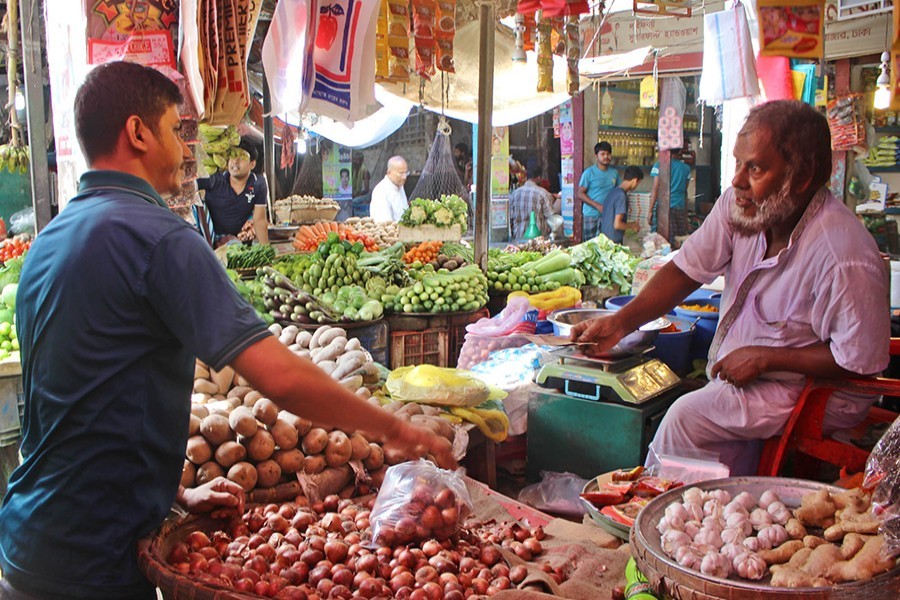The National Security Intelligence (NSI), the country's major civilian intelligence agency, has identified some 29 businesses who were allegedly behind the recent rise in onion prices in the country.
The NSI, after thorough investigation at field-level, submitted a report in this regard to the Ministry of Commerce (MoC) on November 27, to take necessary actions by the government.
According to the report, some 16 onion importers and traders are allegedly involved in the price hike of the essential spice. The price of the item shot up to Tk 250 a kg some days back. Its price is still as high as Tk 220 a kg in Dhaka.
"The 16 importers/traders are either directly or indirectly involved in the onion market manipulation," mentioned in the report, as seen by The Financial Express (FE).
Besides, some 13 commission agents, who purchase onion from the importers and supply to the wholesalers-retailers, are also involved in the price manipulation of the widely consumed spice.
The NSI report further said the importers and commission agents concerned did not keep any written document to conceal their crime.
They even instructed the wholesalers over mobile phones to sell onion at higher prices at retail level.
The 13 commission agents stored onion in different warehouses in Chattogram to create its artificial crisis in the market.
The report noted that L/C (letter of credit) prices of onion, imported from Myanmar, range between Tk 42 and Tk 48 a kg.
"The importers made a propaganda that onion prices in Myanmar were high, and they had to procure the spice at Tk 80 a kg from the neighbouring country."
The NSI, in its report, also commented that trade policy wing of the Bangladesh Tariff Commission (BTC) as well as import and internal trade wing of the MoC had been indifferent the developments over the onion market.
It opined that market monitoring cell of the MoC failed to identify whether the importers are really supplying the spice to the retail market or not.
The cell proved to be irresponsible and it failed to perform its due role, thus giving a scope to raise onion prices in the domestic market.
"Actually the importers have cashed in on the onion export restriction, imposed by India on September 19."
The NSI report noted that a significant quantity of onion was found rotten at Khatunganj, a major import hub of Bangladesh.
"The 13 commission agents of Khatunganj were involved in storing onion to create an artificial crisis in the market, and a portion of their stockpiled onion got rotten."
They supplied onion to local traders at prices ranging between Tk 180 and Tk 200 a kg, which at retail level increased to Tk 220-Tk 250 a kg.
The NSI report opined that the government should have made an accurate projection over the demand and supply of onion.
It also suggested stringent punishment for the people involved in market monitoring and projections.
The agency stressed the need for ensuring legal actions against the traders, commission agents and others, who were involved in the price manipulation that actually forced the consumers to pay abnormally high prices for the spice.
It recommended that the MoC should sit at least once a month to review the demand-supply situation of various essential commodities, including onion.
The NSI-identified 16 businesses are - Mr Sajib, Mr Mom, Mr Forkan, Mr Jahir, Mr Saddam, Mr Quader, Mr Shafi, Mr Ghafur, Mr Mintoo, Mr Khaleque, Mr Tipu and Alif Enterprise of Teknaf in Cox's Bazar, and Ajmeer Bhander, Sourov Enterprise, A Hossain Brothers and Allar Dan Store of Khatoonganj in Chattogram.
The Khatunganj-based commission agents are - Bismillah Banijyalaya, New Shah Amanat Traders, Barkat Bhander, Chowdhury Trading, MS Enterprise, Nurul Hoque Traders, New Baro Awalia Commission Agent, Amin and Brothers, Sekander and Sons, Amin Banijyalaya, Shamim Enterprise, Choudhury and Kamal Uddin Brothers.
Bangladesh produces around 2.3-2.4 million tonnes of onion, equivalent to the country's annual demand, considering 30 gram consumption per day.
But, some 0.5-0.8 million tonnes get damaged due to lack of adequate preservation facilities.
The shortfall is usually met through import from India (around 90 per cent of the total). This year, the neighbouring country restricted it on account of production shortfall.


